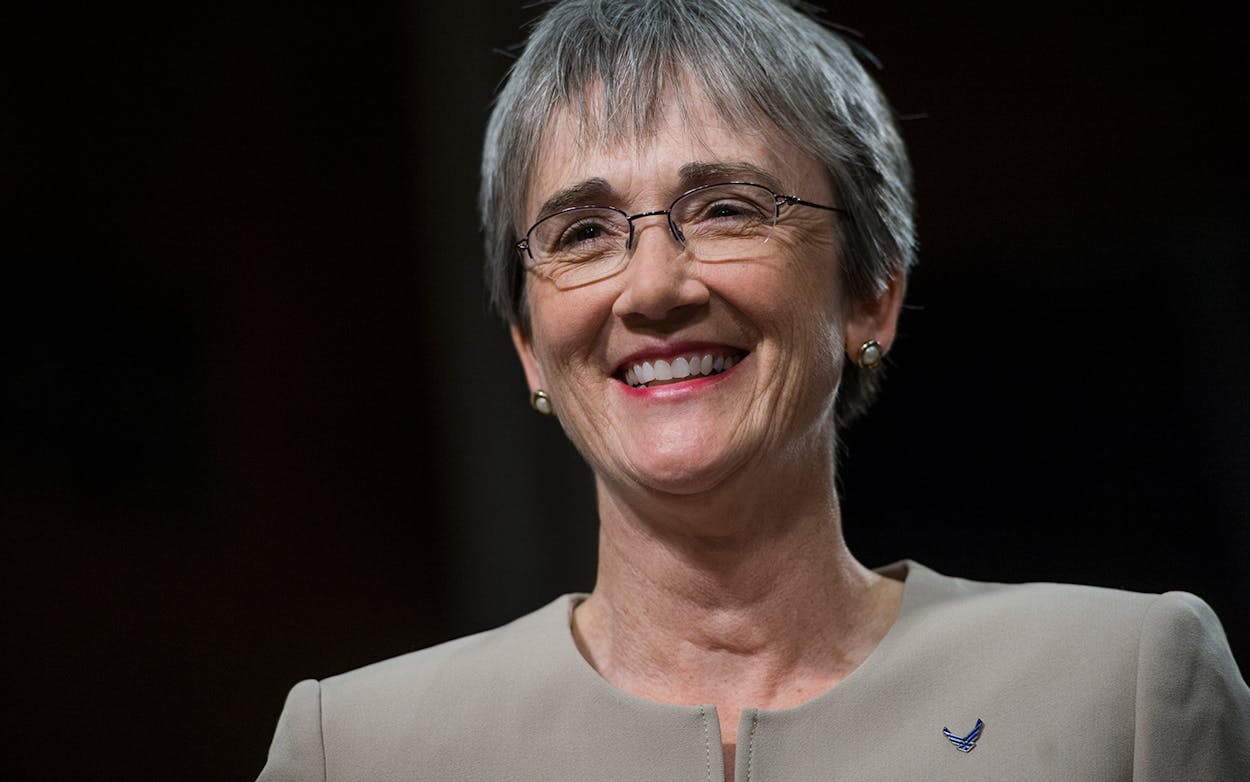In the first presidential search for its El Paso campus in three decades, the University of Texas Board of Regents tapped Heather Wilson and her impressive resume—Rhodes scholar, five-term Republican congresswoman from New Mexico, current secretary of the Air Force. But her selection as sole finalist to succeed Diana Natalicio as president of the University of Texas at El Paso triggered protests on a campus that doesn’t have much history of student activism.
Regents voted unanimously on Friday to name Wilson, 58, as the sole finalist for UTEP president. State law requires a 21-day waiting period before regents can confirm her appointment, and Wilson spent the weekend and Monday at the campus known for its unique Bhutanese architecture. Wilson had widely been reported as a candidate to be President Trump’s next defense secretary, but she opted to leave the administration to take the job leading the 25,000-student border campus.
Wilson was president of South Dakota School of Mines and Technology from 2013 to 2017, when Defense Secretary James Mattis asked her to be secretary of the Air Force. “Honest to goodness, my initial response was, ‘Sir, you do know that being a college president is, like, the best job in America, right?’” Wilson said at a news conference on the UTEP campus Monday. “And he knew that I wanted eventually to come back to higher education in the west, particularly to a public university. This is a little bit earlier than I anticipated, but an opportunity like UTEP doesn’t come along very often.”
Natalicio, UTEP’s president since 1988, had made it her hallmark to focus on a dual mission for the border university—making higher education accessible to low-income and immigrant students while also building a premiere research university. UTEP for several years has been highly ranked among universities that create social mobility, and this year obtained Carnegie R1 status, the top tier for research universities. Wilson vowed to continue that course at UTEP.
“I think that people who want to define universities as having to choose either access or excellence create a false choice, and the great universities in this country and around the world do both. One of the things that bothers me about higher education is universities that define themselves as being great because they exclude people,” Wilson said.
During her news conference, about forty UTEP students gathered outside the Union building to protest her selection, chanting “We deserve better” and “We don’t want Heather.” Their key issue was Wilson’s congressional voting record on LGBT issues. More than 5,000 people have signed an online petition demanding that the regents withdraw Wilson’s finalist designation; it’s not clear how many of those signatures come from UTEP or El Paso.
During the demonstration, students passed out flyers highlighting several positions that Wilson took in Congress—including a vote against a 2007 bill that would prohibit job discrimination based on sexual orientation, and voting in 2004 and 2006 in favor of a constitutional amendment defining marriage as between a man and a woman. When asked in 2007 whether she thought homosexuality was immoral, Wilson told ABC News: “There are things I am willing to tolerate that I am not willing to approve of.”
“Our main issue is her past history as a congressperson. She voted consistently no on LGBT protections or anything related to that,” said Eder Perez, president of the UTEP Queer Student Alliance. “So to have someone like that be considered as a president for UTEP is very disappointing. And we demand that, one, she be removed from consideration, and two, that the Texas Board of Regents get a better candidate that has proven that they can continue to expand protections here at UTEP for LGBTQI rights.”
When asked about the concerns over her LGBT voting record raised by students, Wilson’s response was brief. “My general approach with respect to LGBT issues is to treat everyone with dignity and respect. And I think that’s what a leader should do with everyone,” she said. Wilson also said she would meet with students during a later campus visit.
Wilson has strong support from the UT regents, all of whom were appointed by Republican governors Rick Perry and Greg Abbott. “Dr. Wilson’s broad experience in the highest levels of university leadership, and state and national government—whether securing federal grant awards, advising our nation’s most important national research laboratories, raising philanthropic dollars, or running large, dynamic organizations—will help ensure that UTEP continues its remarkable trajectory as a nationally recognized public research institution,” regent chairman Kevin Eltife said in a statement. “Most importantly, she is deeply committed to student success and has dedicated her life to enhancing upward mobility opportunities for individuals.”
Natalicio announced her retirement in May, bringing an end to the longest current tenure of any president of a U.S. public university. UTEP and its president have become virtually synonymous in El Paso and higher-education circles. “It doesn’t bother me at all,” Wilson said of following a legendary leader. “As I said, I admired Diana from afar when I was a university president. A friend of mine who was a leader in business told me once that A’s hire A’s and B’s hire C’s. I think there’s a corollary that A’s aren’t afraid to follow A’s and to reach out and rely on them for advice and assistance.”
[Disclosure: El Paso freelance writer Robert Moore and UTEP president designate Heather Wilson competed against each other in college debate in the late 1970s, with Wilson winning every time. Moore’s wife, Kate Gannon, is a UTEP faculty member.]
- More About:
- Greg Abbott
- El Paso






